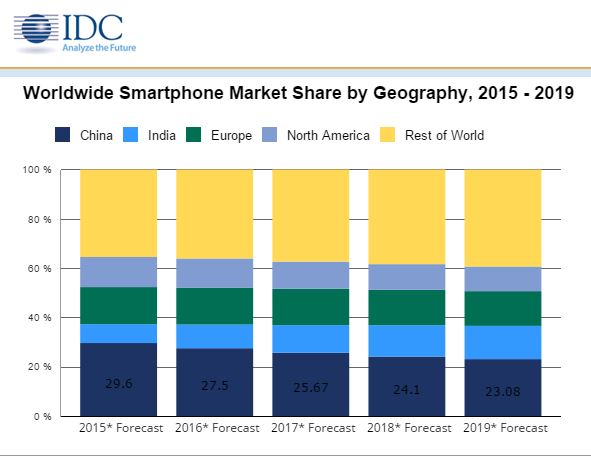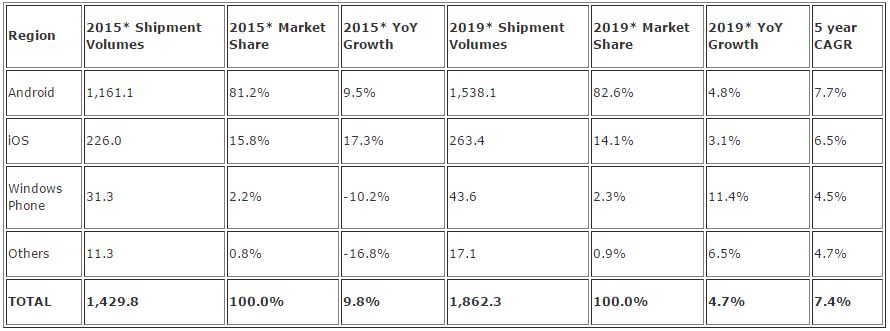Smartphone Sales Growth Falls To Single Digits, Windows Phone Continues Decline, Says IDC
Smartphone shipments will grow only 9.8 percent in 2015 to a total of 1.43 billion devices; this is the first time in years that smartphone growth can be measured in single-digit percentage points, according to market research firm IDC.
China has been the market with the highest growth in the past few quarters, but now that growth has shrunk to low single-digit percentage points, which also impacts the growth of total global sales. According to IDC, China has now become a "replacement market," which means the total number of smartphone owners won’t increase too much over the next few years, but those that already have phones will continue to replace them at a steady clip.
The focus will now switch to the Middle East and Africa (MEA) region, which is expected to see growth of nearly 50 percent year over year in the coming years, surpassing other “hot” markets such as India and Indonesia.
"With the smartphone market finally slowing to single-digit growth, maintaining momentum will depend on several factors," said Ryan Reith, Program Director with IDC's Worldwide Quarterly Mobile Phone Tracker . He added that "the main driver has been and will continue to be the success of low-cost smartphones in emerging markets. This, in turn, will depend on capturing value-oriented first-time smartphone buyers as well as replacement buyers.“
Interestingly enough, he also thinks that budget smartphones will be replaced earlier than the typical two year cycle, not necessarily because the price is so low, but because the low-quality components won’t be able to survive that long in many cases.
Android
Although Android’s growth in terms of market share has stabilized, the IDC believes that the OS will continue to dominate the mobile market for years to come. This year it will increase its market share from 81 percent to 82 percent. IDC believes that Android will maintain its dominance in part because companies that would’ve before tried to build completely new mobile operating systems are now focusing on differentiating on top of Android.
iOS
For iOS, the IDC predicted that its market share will remain around 14 to 15 percent annually, with some clear spikes in sales growth when new products are launched. The company said that Apple could face an excessive inventory problem, within two or three years, in developing markets where refurbished iPhones are being sold. It’s also why it thinks Apple has become more aggressive with its trade-in programs in the past couple of years.
Get Tom's Hardware's best news and in-depth reviews, straight to your inbox.
Windows Phone
The IDC doesn’t expect Windows’ market share in smartphones to grow much in the coming years, despite Microsoft’s heavy investment in promoting the platform (including offering it as a free upgrade for desktop users in the first year).
Back in 2011, IDC predicted that Windows Phone would have 20.3 percent of the market, increasing its share by ten times what it was back then. This prediction was made in part because the IDC believed most of Nokia’s Symbian market share would transition into Windows Phone. However, that never really happened, as most Symbian users switched to Android phones.
Had Nokia chosen Android instead of Symbian, the company may have had a better chance of keeping its market share. Nokia chose Windows Phone believing it could more easily differentiate from all the Android OEMs, but in reality, Windows Phone served to only further marginalize Nokia in the market.
Windows Phone’s market share has remained virtually the same since it launched five years ago, at around two percent of global smartphone sales, despite Nokia’s and Microsoft’s best attempts and billion dollar investments to change that. The OS saw a -10.2 percent decline in 2015 compared to 2014, and it’s expected to further decline in 2016, despite Windows 10 being ready soon for mobile.
The IDC believes that the weak market performance is due to low support from OEMs, but the OEMs won’t support it as long as consumers don’t want it for a lack of a strong ecosystem. Microsoft started two projects, Islandwood and Astoria, to port iOS and Android apps to Windows 10 for mobile, although some rumors say that Project Astoria (for Android apps) has been delayed and may even be cancelled, due to the poor performance of the apps.
For now, the Islandwood project is still alive, but it remains to be seen how fast it will be adopted by iOS developers, and whether that will have the desired effect of increasing Windows' market share in mobile.
______________________________________________________________________
Lucian Armasu joined Tom’s Hardware in early 2014. He writes news stories on mobile, chipsets, security, privacy, and anything else that might be of interest to him from the technology world. Outside of Tom’s Hardware, he dreams of becoming an entrepreneur.
You can follow him at @lucian_armasu. Follow us on Facebook, Google+, RSS, Twitter and YouTube.
Lucian Armasu is a Contributing Writer for Tom's Hardware US. He covers software news and the issues surrounding privacy and security.
-
malicemizer They say how android is dominating but they don't talk about profit margins. Love em or hate em Apple is still light years ahead of the competition in terms of actual real world profit.Reply -
house70 Reply17069966 said:They say how android is dominating but they don't talk about profit margins. Love em or hate em Apple is still light years ahead of the competition in terms of actual real world profit.
They also don't talk about climate change, international politics, fossil fuel availability, and the list goes on. Point being, why address things that are NOT relevant to the article. My beermonger has record profits, too, if you're interested. -
therealduckofdeath What an absolutely bizarre thing to celebrate, malicemizer. Yay, Apple is overcharging you 100% on their premium mid-range stuff. Awesome.Reply -
atheus An organization named "IDC" is just distracting. Every time you write it I automatically read "I don't care".Reply
I'm actually looking forward to windows 10 phone, and I would imagine I'm not the only one. I'm sick and tired of Android's completely broken update pipeline. The only concern is whether the app market will rally — as there are many vital apps like the one that controls my Denon A/V receiver which aren't available in windows, and which aren't really optional for my day-to-day life. -
hannibal Yep, my old 830 still gets updates where similarly cheap androids... nada...Reply
So Windows phones has upper hand in upgrades, compared to Android devices.
Those Nexus devices are good, but otherwise it is not so good. Apple also have reasonable good upgrade path, but they are also quite expensive.
-
falchard Probably a good sign for Windows Phone. If there is one consistency on IDC predictions its that they are always wrong.Reply -
RunLuke Google said they'll make some hardware standards regarding Android so that upgrades can roll out globally. I really hope they follow through. It's necessary.Reply
I've reluctantly switched to iOS from a OnePlus One that didn't work at all. I'm amazed at the overall quality of it and how it just seems to work, never needing a restart. Still, there are som niggling, annoying and strange bugs that I have no idea how got through their QC and QA. Most frustrating is the missing keyboard when "quick-replying", still better than the oneplus keyboard ghost touching all over the place.
I had a windows phone why I was in hiatus over what device to get after dropping the OnePlus. I love the operating system but feel oddly sorry for MS because there are some things that are really frustrating about it. They made something beautiful with some issues that I just can't ignore.


